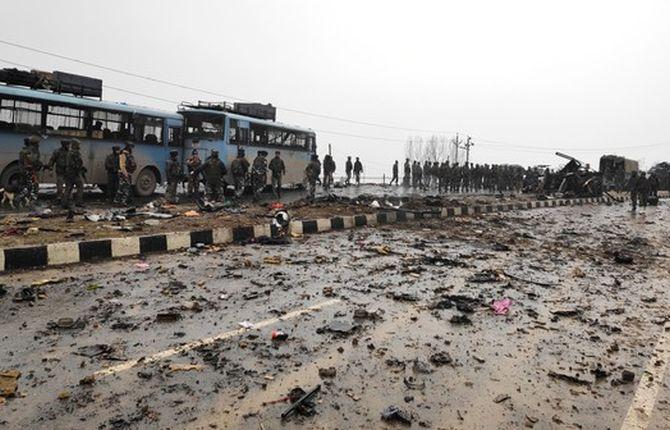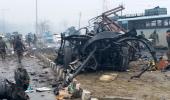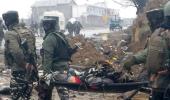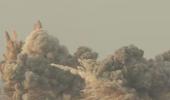'Nobody is going to fight India's war.'
'India has to fight its own war against the rogue State and the evil forces nurtured by it,' argues Anand Kumar.

Every time a Pakistan-sponsored terror strike happens in India a demand arises for strong action against that country.
The same is the case after the Pulwama terror attack in which more than 40 CRPF personnel lost their lives.
Under intense pressure to act after the Uri attack, the Indian government went for a surgical strike.
After the Pulwama attack, once again there is widespread anger in the country against Pakistan.
People are demanding that the government should ask the security forces to carry out a repeat surgical strike.
But is a surgical strike the answer to incessant terror attacks emanating from the soil of Pakistan.
The terrorist attack in Pulwama occurred at a very crucial time when elections are approaching in India.
This attack is now bound to have its impact on the way people are going to vote.
At first sight, it appears that the terrorist attack has aroused nationalist feelings in large parts of the country which might benefit the ruling National Democratic Alliance.
But it is also a double edged sword in the sense that the Bharatiya Janata Party-led NDA government would have to come up with a solid response to this attack.
If the government fails to do that in a convincing manner, it will affect its credibility.
The government is probably aware of that and is trying to isolate Pakistan diplomatically before going in for retaliation.
In this effort, the Indian government has been largely successful and has the support of the European Union, Russia, France and, most importantly, the United States.
However, Pakistan may not be completely isolated as it has its sympathisers in the Muslim world.
Many of these countries support Pakistan, unmindful of what it does taking it as a co-religionist.
Similarly, it is futile to expect China's support on Pakistan-sponsored terrorism and on Jaish e Mohammad terrorist Masood Azhar.
China buys the Muslim world's silence over what it is doing in its Xinjiang province by scuttling India's attempt to get Masood Azhar branded an international terrorist.
Countries like the United States say India has the right of self-defence.
This is the best one can get from the international community.
Nobody is going to fight India's war.
India has to fight its own war against the rogue State and the evil forces nurtured by it.
The Indian government so far has not been able to act decisively against Pakistan because of the nuclear parity achieved by that country.
It is often argued that India cannot act like the United States as the power asymmetry between India and Pakistan is not that great.
But should India go on taking these terror strikes until it becomes militarily as powerful as the United States?
The obvious answer is no.
There is no peace for India with Pakistan as it exists today.
Kashmir is just a smokescreen for the larger Pakistani agenda to harm India.
Its main policy is to bleed India through a thousand cuts.
If this is so, then what is India's Pakistan policy?
Do we have a policy for Pakistan at all?
Border firings or surgical strikes cannot be an answer to Pakistan's incessant flow of terrorists to India.
We can't let Pakistan hold our security and prosperity hostage to its nefarious acts.
If Pakistan wants to bleed India through a thousand cuts, then shouldn't India also try to cut it in a few pieces? This will take care of its nuclear parity to a great extent.
It is time India starts following a pro-active policy on Pakistan instead of indulging in reactive surgical strikes.
Pakistan is shamelessly denying its involvement in the Pulwama terror attack while Jaish e Mohammad chief Masood Azhar enjoys the Pakistani State's hospitality.
This terror attack will boost the morale of terrorists who have suffered great losses due to the counter terrorist operations launched by the security forces in Kashmir.
This will also bring wider publicity to Jaish e Mohammad and help it get new recruits, both in Pakistan and from Kashmir.
Pakistan Prime Minister Imran Khan made some fake peace overtures after taking over.
India was right in rejecting his offers for talks given his radical Islamist credentials.
He is a known Taliban supporter.
The suicide bomber involved in the February 14 terror attack claimed to be an admirer of the Taliban.
There is a seamless relationship between the State and non-State actors in Pakistan.
Pakistan can't shun responsibility for the terror attack while nurturing Jaish e Mohammad and Lashkar-e-Tayiba.
The terror attack has pointed out the grave security situation prevailing in South Asia where a number of Islamist terror organisations are running amuck with the support of the rogue Pakistani State.
This situation has been made worse by the US decision to withdraw troops from Afghanistan.
This has boosted the morale of the Taliban and other Islamist terrorist groups.
Pakistan has largely emerged unharmed from the US war on terror despite having close alliance with the Taliban, al Qaeda and other Islamist terrorist groups.
Under threat from President George W Bush Pakistan pretended it was changing sides, but in reality remained closely allied with these groups.
This strategy helped Pakistan avoid the United States's wrath.
Moreover, it extracted military assistance from the United States in the name of helping Washington in its war on terror.
By the time the United States saw through Pakistan's double game, fatigue had already set in and American leaders had started talking of withdrawal from Afghanistan.
The United States is located far from the terror hub of the Af-Pak region.
India unfortunately shares its border with the rogue State called Pakistan.
India must realise that there is no peace for this country as long as the present political and military structure continue in Pakistan.
In the present set-up in Pakistan, the military calls the shots and India is its avowed enemy.
The liberal approach of giving Pakistan the status of most favoured nation has only invited more terror attacks on this country.
Though that MFN status has now been withdrawn, it is time India takes a relook at its Pakistan policy which is mostly reactive.
The creation of Bangladesh in 1971 changed the dynamics of the India-Pakistan relationship.
Only a similar development can once again change the status quo in the India Pakistan relationship.
This would dent Pakistani nuclear parity with India to a great extent and make its policy of strategic depth in Afghanistan less desirable.
Until that happens, there is no permanent peace for India.
Anand Kumar is an Associate Fellow at the Institute for Defence Studies and Analyses, New Delhi.










